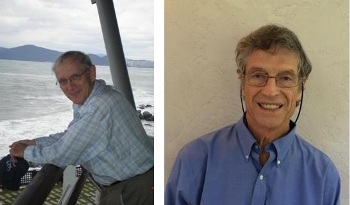Oct 28 2014
Each year, the American Physical Society prizes honor the world's leading physicists. This year, two of those coveted awards are going to researchers at the University of Florida.
 Pierre Ramond and Arthur Hebard
Pierre Ramond and Arthur Hebard
The society has announced Pierre Ramond and Arthur Hebard – both distinguished professors of physics at UF – as 2015 winners, placing them in the company of past winners from institutions such as Princeton, MIT, Yale, Columbia, Stanford and Cornell, including more than 20 Nobel Prize winners.
Ramond, whose research focuses on supersymmetry and superstring theory, won the Dannie Heineman Prize for Mathematical Physics, given by the American Physical Society and the American Institute of Physics on behalf of the Heineman Foundation for Research, Educational, Charitable, and Scientific Purposes.
Arthur Hebard, who studies thin films used in superconductors and other applications, shares the Oliver E. Buckley Condensed Matter Physics Prize with scientists from the University of Minnesota, Stanford and the University of California, Santa Barbara.
Both prizes are considered top honors in their fields.
Ramond, who came to UF in 1980, grew up in Neuilly/Seine, a suburb of Paris, moving to the United States after high school. After graduating from the Newark College of Engineering in New Jersey with a degree in electrical engineering, he decided to follow his interest in physics and attended Syracuse University, where he received his doctorate in 1969. He was a postdoctoral fellow at the National Accelerator Laboratory, now the Fermi National Accelerator Laboratory, where his work formed the basis of supersymmetry and superstring theory, and later taught at Yale and Caltech. His prize citation from the APS notes "pioneering foundational discoveries in supersymmetry and superstring theory."
Hebard taught at Stanford and worked at Bell Labs before coming to UF in 1996. Despite being placed in remedial math in high school, the native New Yorker graduated magna cum laude from Yale with a degree in physics, going on to earn a master's and doctorate at Stanford. He credits his success in part to inspiration from his physician father, who encouraged his proclivity to take things apart to see how they worked. Hebard's citation notes his "discovery and pioneering investigations of the superconductor-insulator transition, a paradigm for quantum phase transitions."
Ramond's prize will be formally awarded at the APS annual April meeting in Baltimore, while Hebard's will be given at the organization's annual March meeting in San Antonio.